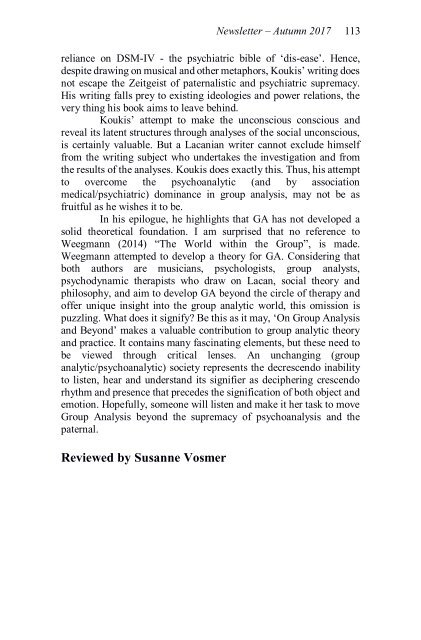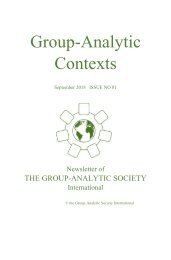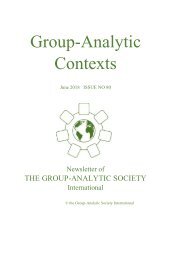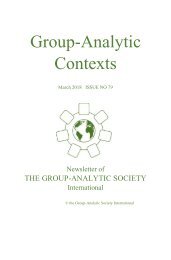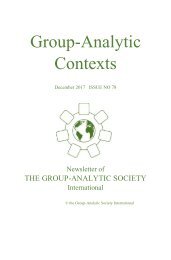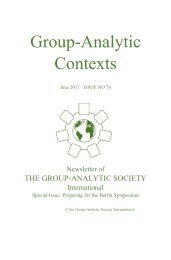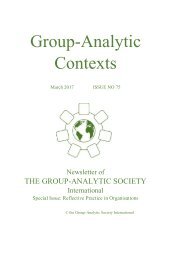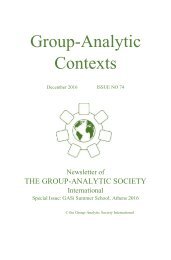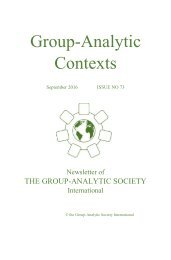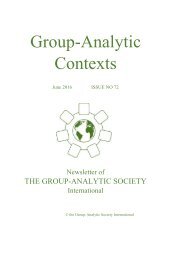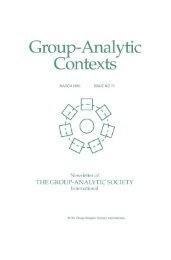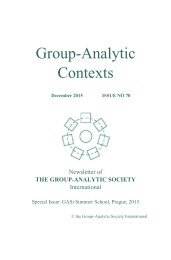Group Analytic Contexts, Issue 77, September 2017
Newsletter of the Group Analytic Society International
Newsletter of the Group Analytic Society International
Create successful ePaper yourself
Turn your PDF publications into a flip-book with our unique Google optimized e-Paper software.
Newsletter – Autumn <strong>2017</strong> 113<br />
reliance on DSM-IV - the psychiatric bible of ‘dis-ease’. Hence,<br />
despite drawing on musical and other metaphors, Koukis’ writing does<br />
not escape the Zeitgeist of paternalistic and psychiatric supremacy.<br />
His writing falls prey to existing ideologies and power relations, the<br />
very thing his book aims to leave behind.<br />
Koukis’ attempt to make the unconscious conscious and<br />
reveal its latent structures through analyses of the social unconscious,<br />
is certainly valuable. But a Lacanian writer cannot exclude himself<br />
from the writing subject who undertakes the investigation and from<br />
the results of the analyses. Koukis does exactly this. Thus, his attempt<br />
to overcome the psychoanalytic (and by association<br />
medical/psychiatric) dominance in group analysis, may not be as<br />
fruitful as he wishes it to be.<br />
In his epilogue, he highlights that GA has not developed a<br />
solid theoretical foundation. I am surprised that no reference to<br />
Weegmann (2014) “The World within the <strong>Group</strong>”, is made.<br />
Weegmann attempted to develop a theory for GA. Considering that<br />
both authors are musicians, psychologists, group analysts,<br />
psychodynamic therapists who draw on Lacan, social theory and<br />
philosophy, and aim to develop GA beyond the circle of therapy and<br />
offer unique insight into the group analytic world, this omission is<br />
puzzling. What does it signify? Be this as it may, ‘On <strong>Group</strong> Analysis<br />
and Beyond’ makes a valuable contribution to group analytic theory<br />
and practice. It contains many fascinating elements, but these need to<br />
be viewed through critical lenses. An unchanging (group<br />
analytic/psychoanalytic) society represents the decrescendo inability<br />
to listen, hear and understand its signifier as deciphering crescendo<br />
rhythm and presence that precedes the signification of both object and<br />
emotion. Hopefully, someone will listen and make it her task to move<br />
<strong>Group</strong> Analysis beyond the supremacy of psychoanalysis and the<br />
paternal.<br />
Reviewed by Susanne Vosmer


